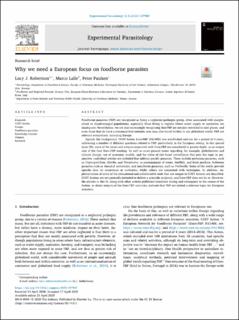| dc.description.abstract | Foodborne parasites (FBP) are recognized as being a neglected pathogen group, often associated with marginalized or disadvantaged populations, especially those living in regions where water supply or sanitation are inadequate. Nevertheless, we are also increasingly recognising that FBP are not just restricted to such places, and even those that do have a circumscribed endemic area may also travel further in our globalised world; FBP are relevant everywhere, including Europe.
Against this background, COST Action Euro-FBP (FA1408) was established and ran for a period of 4 years, addressing a number of different questions related to FBP, particularly in the European setting. In this special issue (SI), some of the issues and outputs associated with Euro-FBP are considered in greater depth, as an output also of the final Euro-FBP meeting. As well as more general issues regarding, for example, globalization and climate change, use of economic models, and the value of risk-based surveillance that puts the topic in perspective, individual articles are included that address specific parasites. These include protozoan parasites, such as Cryptosporidium, Giardia, and Toxoplasma, as contaminants of water, shellfish, and fresh produce, fishborne parasites such as Anisakid nematodes, and meatborne parasites, such as Trichinella. Some of the works provide specific data on occurrence or outbreaks, whilst others are concerned with techniques. In addition, implementation of some of the educational and collaborative tools that are unique to COST Actions are described. COST Actions are not generally intended to deliver a scientific endpoint, and Euro-FBP does not do so. However, the articles in this SI, along with other articles published elsewhere during and subsequent to the course of the Action, as direct outputs of the Euro-FBP activities, indicate that FBP are indeed a relevant topic for European scientists. | en_US |

